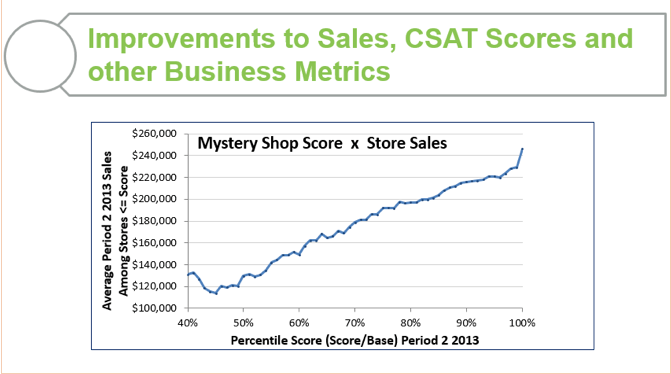
As a retail brand, there are certain elements your company deems important in order to uphold your brand image to your customers. It’s imperative that each frontline employee represents the brand according to the standards set for service delivery. But with so many disparate locations, how can you ensure this is happening? Especially in light of the problems facing the retail industry today. It’s harder than ever for a site manager to maintain these standards, and for the larger corporation to know how best to monitor, motivate, and train personnel to meet these expectations. Retail site operators face numerous challenges today such as:
- Shrinking margins/credit card fees
- High employee turnover
- More savvy customers
- E-commerce (competition and/or complementary)
- Multiple layers from corporate to the frontline (game of telephone)
Mystery Shopping Helps Your Business in Spite of the Challenges
Mystery shopping is designed to break through all of these challenges to objectively monitor, evaluate, and report the consistency of the customer experience delivery at the frontline. In mystery shopping, expert, unbiased mystery shoppers offer you a complete, unvarnished, and unemotional view of the quality and consistency of your customer experiences at the ground level across all of the channels where you do business. This gives you the information and insights you need to protect your brand, continually improve your customer interactions, and correct problems before they impact your business.
Mystery shopping can help you understand if your business is struggling with things like items being out of stock, wait times that are too long, dirty bathrooms and rude cashiers, so you can take action and improve the experience.
There are many types of mystery shopping, but a few that are useful to retail are:
- Customer Experience Shops – reveal the behavioral, attitudinal and subjective elements of the customer experience
- Customer Lifecycle Shops – objectively understand your customers’ experience throughout their entire interaction with your brand – from the decision-making process through final purchase and product service
- Competitive Shops – discern best practices and other CX dimensions from competitive brands
- Regulatory Compliance Shops – ensure frontline compliance to federal or state-regulated mandates
Mystery shops can also be conducted in a variety of channels, so if your business operates a call center, brick and mortar locations, and conducts business via the internet, mystery shoppers can assess each of those channels to ensure consistent service delivery across them all.
Mystery Shop Performance Affects Your Business Outcomes
When first implementing a mystery shopping program, it’s of utmost importance to get buy-in from all levels of your organization. It’s especially important that your site managers first understand the need to adhere to corporate-defined customer experiences and the consistent, operational expectations the company has for all its sites.
Why is it important? In short, focusing on the customer experience increases sales.
Research shows that your company’s CX maturity is directly related to business outcomes. The most mature companies in CX practices see a three-fold improvement in financial performance and customer retention than those who only dabble in CX.[1]
In addition, we’ve seen example after example of how sites that score higher in mystery shops also record higher sales than lower-performing sites.
These are just a couple of examples you can share throughout your organization to make the case for a focus on CX and the benefits of implementing a mystery shopping program. Coupled with training on your brand’s specific standards, your frontline will have what they need to fully participate in a program that allows your brand to get an objective view of how your frontline performs on the items that are important to your customers and your brand.
Understanding the Business Impact Motivates Operators to Perform
Once site managers understand that focusing on the customer experience can impact their bottom line, they are more likely to participate in a program that makes sure they adhere to the brand’s standards for the customer experience. Even if the product you are selling is great, it’s the engagement with the employees that makes a difference to customers. An engaged workforce best maintains positive customer experiences.
At that point, a mystery shop program can help a site manager:
- Understand what’s expected of his/her operation and staff
- Objectively view the consistency of the customer experience delivery at the frontline
In turn, this helps the c-suite and other stakeholders determine strengths and areas of improvement at sites and across networks. Identifying areas for improvements drives initiatives to update training, create new programs based on incentives/penalties, develop rewards/recognition programs, update existing processes and expectations, etc.
This benefits each level of the organization.
- Corporate – Assess strategy and operating procedures
- Field Support – Target support to units needing the most help
- Site Operator – Obtain real-time feedback and solutions for improvement
- Frontline Employee – Clear expectations on delivery
- Consumer – Knows what to expect from your brand, more likely to return, contributing to increase in sales
Communication of the Results Must Be Clear and Useful
The tool your business uses to report the results out to your stakeholders must be clear and useful. Your stakeholders should be comfortable accessing reports in order to easily identify strengths, pinpoint opportunities, and understand how to address those opportunities. This will help them view the program as an overall benefit to their business. They get to celebrate victories and successes with their teams, and can also easily address where improvements are needed in order to continue to focus on the customer experience, thereby increasing sales. When site operators can easily take action on improving their performance, they begin to see their bottom line improve, which in turn gets them even more excited and engaged in the program.
Unify Your Brand
A mystery shop program can help break through the problems facing the retail industry today. Site managers can keep up with corporate standards, and corporate can be informed on how best to monitor, motivate and train toward their expectations. Mystery shopping will ensure that each frontline employee represents the brand as it should be presented. It will unify your brand and streamline your success.
[1] Source: MaritzCX Program Market Sizing Study (Population Benchmarking Study) conducted Oct 21-22, 2015 (n=1000); MaritzCX CXEvolution Study conducted August 2015-February 2016 (n>5,000)

